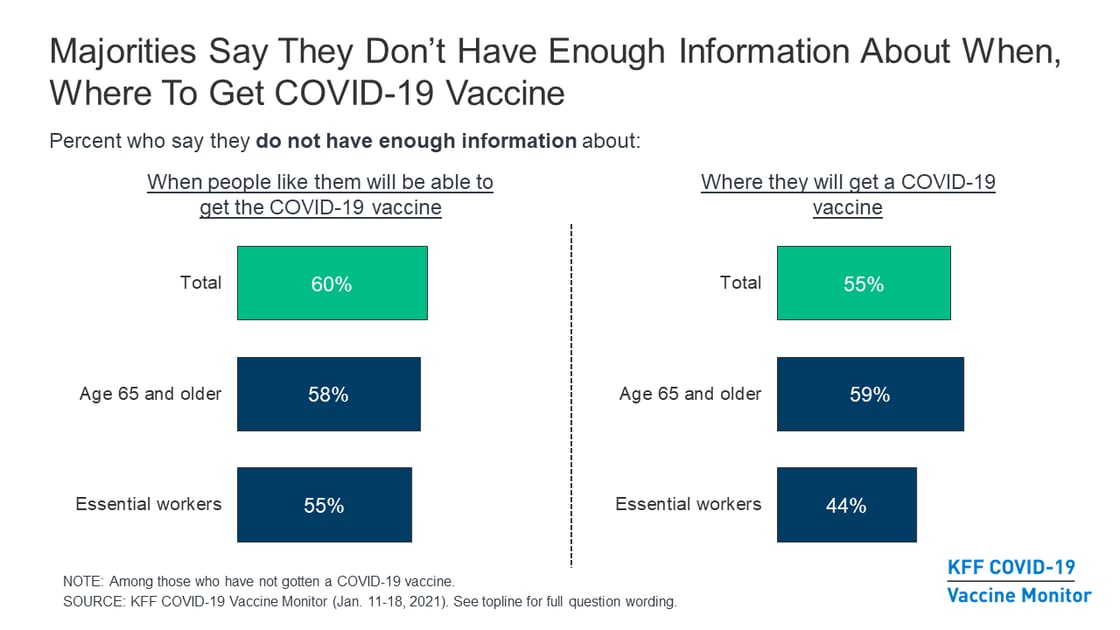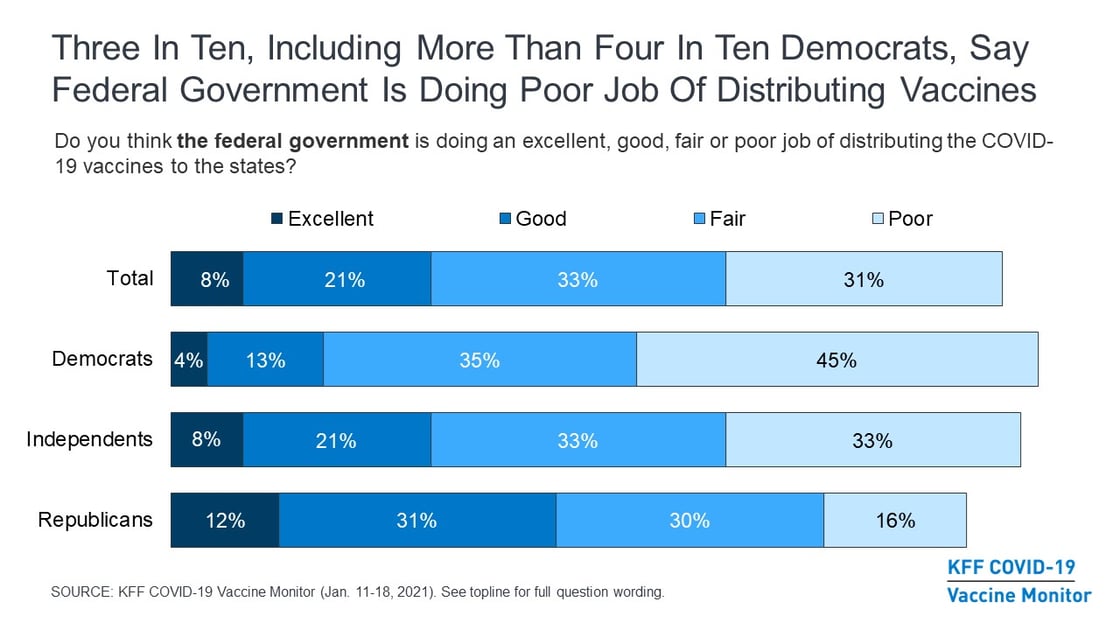
The independent source for health policy research, polling, and news.
Nearly 6 in 10 Older Americans Don’t Know When or Where They Can Get a COVID-19 Vaccine; Black and Hispanic Adults among the Groups Least Likely to Have Enough Information
Two Thirds of the Public Give the Federal Government Low Marks for the Vaccine Rollout Under the Trump Administration; Half Expect the Situation to Get Better Under President Biden
Despite Optimism about COVID-19 Vaccines in the Future, Half Say They are Frustrated with the Current Situation and Nearly a Quarter are Angry
While older Americans are a high-priority group for getting a COVID-19 vaccine, the latest KFF COVID-19 Vaccine Monitor report finds that, among those who have not yet been vaccinated, most people ages 65 and older say they do not have enough information about when (58%) and where (59%) they will be able to get vaccinated.
Most essential workers, another high-priority group, say they have enough information about where to get a vaccine (55%) but do not have enough information about when they will be able to get vaccinated (55%). This includes some health care workers who have not yet gotten vaccinated and say they don’t have enough information about when they will be able to get vaccinated (21%).
“The Biden administration has been left with a huge challenge on vaccine administration. Most Americans don’t know when or where they can get a vaccine, including older Americans, who are already eligible to get a vaccine in a growing number of states,” KFF President and CEO Drew Altman said. “Understandably large numbers of people are frustrated, angry and confused.”
The findings highlight a key challenge facing public health authorities seeking to get their limited supplies of vaccine into the arms of priority populations. While the priorities differ across states, older Americans and at least some essential workers are high priorities for early phases of distribution across states.
Among the broader public, most who have not yet been vaccinated say they do not have enough information about when people like them will be able to get a vaccine (60%) or about where they can get a vaccine (55%).
Black and Hispanic adults, as well as low-income households, are among the groups least likely to say they have enough information. Within each group, at least two thirds say that they do not have enough information about when they can get vaccinated, and at least 6 in 10 say they don’t have enough information about where to get vaccinated.
Based on the latest Monitor survey fielded during the last days of the Trump administration, the Monitor report finds that about two thirds (65%) of the public rate the federal government’s distribution efforts so far as “fair” or “poor.”
There is a wide gap in how partisans grade the federal government’s performance. Republicans are more than twice as likely as Democrats to say the federal government is doing an “excellent” or “good” job (43% v. 17%), and Democrats are much more likely than Republicans to give negative marks (80% v. 46%). Independents fall in the middle with two-thirds giving the federal government negative marks.
Most Americans also rate their state government’s performance as only fair or poor (60%), though without a partisan divide, as majorities of Democrats, Republicans and independents hold this view.
About half (48%) of the public expects vaccine distribution to “get better” under President Biden’s administration, while most others expect the situation to “stay about the same” (36%). Relatively few (12%) expect distribution to “get worse.”
Democrats overwhelmingly expect improvements under President Biden (83%), as do a plurality of independents (45%). While few (12%) Republicans expect the situation to “get better” under President Biden, most (57%) expect it to stay about the same.
With millions of health care workers, long-term care residents and staff, and older adults across the country already getting vaccinated against COVID-19, most (66%) of the public say they feel “optimistic” that things will get better.
At the same time, half (50%) say they are “frustrated,” a third (33%) say they feel “confused,” and nearly a quarter (23%) say they are “angry,” highlighting the difficulties ahead as the vaccine rollout continues.
While optimism crosses party lines, more Democrats (61%) than Republicans (42%) or independents (48%) say they are frustrated, reflecting their higher levels of concerns about the pandemic. The groups most likely to express confusion about the current situation includes at least four in ten Black adults (46%), those under age 30 (40%), and those with annual incomes under $40,000 (42%).
Other findings include:
- Two thirds (65%) of the public, including most Democrats (70%), independents (64%), and Republicans (59%), are confident that vaccines are being distributed in a way that is fair, similar to the December KFF COVID-19 Vaccine Monitor which found 67% of adults were confident the vaccine would be distributed in a fair manner.
- While most Black adults express confidence that vaccines overall are being distributed fairly, half (52%) say they lack confidence that the needs of Black people are being taken into account. Among Hispanic adults, a significant minority (44%) lacks confidence that the needs of Hispanic people are being taken into account.
Next week, KFF will release new findings on people’s willingness to get a vaccine.
Designed and analyzed by public opinion researchers at KFF, the KFF Vaccine Monitor survey was conducted from Jan. 11-18 among a nationally representative random digit dial telephone sample of 1,563 adults, including oversamples of adults who are Black (310) or Hispanic (306). Interviews were conducted in English and Spanish by landline (287) and cell phone (1,276). The margin of sampling error is plus or minus 3 percentage points for the full sample. For results based on subgroups, the margin of sampling error may be higher.
The KFF COVID-19 Vaccine Monitor is an ongoing research project tracking the public’s attitudes and experiences with COVID-19 vaccinations. Using a combination of surveys and qualitative research, this project tracks the dynamic nature of public opinion as vaccine development and distribution unfold, including vaccine confidence and hesitancy, trusted messengers and messages, as well as the public’s experiences with vaccination.

